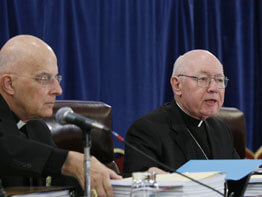BALTIMORE – In his last official address as president of the U.S. Conference of Catholic Bishops, Bishop William S. Skylstad of Spokane, Wash., urged a leadership style that does not measure success “moment to moment” but instead follows the example of Jesus and Blessed Mother Teresa of Calcutta.
“We cannot shrink from our calling to be shepherds, to be leaders,” he said. “As Christ made it his mission to show us his Father, to teach us to seek the will of his Father, we cannot in fidelity to him renounce or weaken our proclamation of the truth.”
Bishop Skylstad spoke Nov. 12 at the beginning of the U.S. bishops’ fall general meeting in Baltimore. He was to complete a three-year term as USCCB president at the close of the meeting Nov. 15.
In his talk, the bishop touched on various issues the bishops’ conference faced during his term.
“We need to continue to speak out and teach our people joyfully to embrace life, to incorporate fully the church’s vision about chastity and the nature of marriage, and to understand the humanly and spiritually corrosive results of the contraceptive mentality and lifestyle,” he said.
“As shepherds, we will continue to be clear about the fundamental injustice of abortion and of sacrificing sacred human lives at their earliest moments for the sake of progress in medicine and science, or for convenience,” he added.
Bishop Skylstad also called on his fellow bishops to “continue to move minds and hearts to care for those who are needy and disadvantaged” and said the clergy sex abuse scandal “has given us a tremendous opportunity for a lesson in humility as well as in needed leadership action.”
“While much remains to be done, and we can never forget what has happened in the past, I am most sincerely grateful for all that has been accomplished in the past five years,” he said of the bishops’ response to the abuse scandal.
The steps they are taking to shed light “on this dark corner of humanity is making a difference,” he added. “Things will never be the same for the next generation of children. They will be better; and for that, we as a church can be very proud.”
But most of Bishop Skylstad’s address focused on leadership, which he called “one of the great challenges to our society and culture.”
Leadership is seen in some circles “not as a service to the common good, but as a means to victory and dominance,” he said.
Calling Jesus of Nazareth “the true model of leadership,” the USCCB president said, “For us as bishops, a deep and Christ-like vision of leadership must be at the heart of our service. Christ has called us, as successors of the apostles, to be his voice in our time.”
Similarly, Mother Teresa’s leadership was “based in a fundamental and visible humility that challenged, but also attracted our world,” Bishop Skylstad said. But as her recently released writings showed, “her humility … was a deep spiritual reality. God, it seems, gave her periods of dryness during which he hid his face from her.”
“Our leadership must be rooted in the humility of a life of prayer, every day and before the Eucharist,” he said. “Our leadership as shepherds will never be authentic if our souls are not one with Christ the shepherd.”


